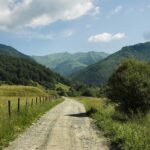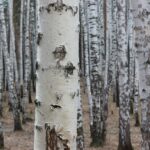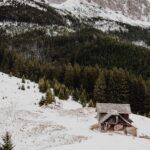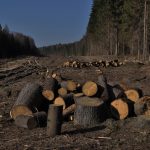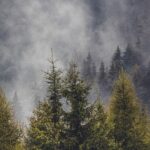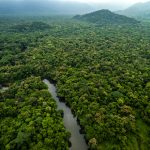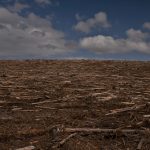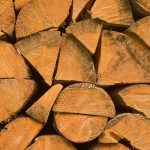
In the first three quarters of 2024, 10,459 field checks were carried out in state-owned forests, and the total volume of illegally felled timber amounted to 14,671 cubic metres (m3), generating damages of 7.3 million lei, down by 8% compared to the same period last year. Part of this volume, totalling 3,984 cubic metres, was attributed to forestry staff,” the sources said. Romsilva administers 3.13 million hectares of state-owned forests, equivalent to 48% of the country’s forests.
The documentary, which went to radio over the weekend, alleges that up to 4% of IKEA’s furniture products—including Sniglar cribs and Proppmatt chopping boards—come from Romania, where a panel of international experts accuses the giant of violating rules set up to protect the forest, wildlife, and biodiversity.
On June 20, the National Anticorruption Directorate (DNA) announced it was investigating a timber mafia network involved in illegal logging, made up of businessmen and police officers.
A network that was illegally cutting down forests in Alba County covered its tracks with the help of police officers. Moreover, the timber thieves had a system in place to monitor police officers who did not „collaborate” and insisted on continuing investigations into illegal logging, according to anti-corruption prosecutors.
From 2021 to 2024, one-third of the tree removals recorded in the SUMAL database in Bihor County were categorized as “accidental.” In total, during this period, over 300,000 cubic meters of trees were cut under the accidental logging classification, out of more than 1 million cubic meters overall.
Dan Turiga from Agent Green, an environmental protection NGO, indicated that they have identified such discrepancies. “We found healthy, standard-quality, Class I trees marked for removal under the accidental logging category in Bistrița”, Turiga noted.
In April 2024, as the Senate debated a series of amendments to the Forest Code—amendments required by the National Recovery and Resilience Plan (PNRR)—the most heated dispute between politicians and civil society centered around the article mandating the confiscation of vehicles used to transport illegal timber. Currently, the law is stalled in the Chamber of Deputies.
In spring, while the Ministry of Justice and wood industry associations argued that vehicles should only be confiscated at the end of the legal process—citing a provision from the Criminal Code—environmental activists called for the immediate seizure of trucks, a measure that was introduced four years ago in the Forest Code and has shown results in certain areas. Many prosecutors from small local offices handling environmental cases do not apply the law consistently when it comes to seizing trucks used for transporting illegal timber. While some investigators carry out their duties exemplary, others fail to understand the gravity of the situation or suddenly become lenient, returning the trucks to their owners. The leadership of the General Prosecutor’s Office does not even keep track of these cases.
20 million cubic meters of wood are illegally cut every year in Romania according to data provided by National Forest Inventory and confirmed by the Minister of Environment. Last year, companies dealing in cutting and processing wood registered a total income of 6 billion euros. More than half represents illegal wood, untraced and untaxed according to numbers coming from the Romanian Ministry of Environment.
An investigation by the European Commission has confirmed the circumvention of anti-dumping duties by firms buying plywood from Turkey and Kazakhstan. The investigation found evidence of laundering of finished Russian plywood – a breach of EU sanctions put in place following the Ukraine invasion.
Inspectors also confirmed Turkish and Kazakh firms are using Russian raw materials to make birch ply for sale in Europe. The European Commission investigation found evidence of plywood made in Russia being simply laundered and re-labelled as of Kazakh or Turkish origin, something which should be of interest to authorities tasked with enforcing EU sanctions, both at EU and Member State level. Though not covered by sanctions, these sales are in clear breach of the EU Timber Regulation (EUTR), a law meant to halt illegal wood use in Europe.
Today Earthsight, which submitted evidence to the EU’s investigation, has filed EUTR complaints pertaining to 31 firms across nine member states whose suppliers were confirmed by the EU to be using Russian raw materials.
The TV loop aims to identify and take action against instances of false claims or other violations of FSC requirements.
The scope of this Eurasia birch wood panels TV loop is:
- Geographic areas: China and central and eastern European countries (Bosnia and Herzegovina, Bulgaria, Croatia, Czech Republic, Estonia, Georgia, Greece, Hungary, Latvia, Lithuania, Moldova, Poland, Romania, Serbia, Slovakia, Slovenia, and Ukraine).
- Product type: Plywood
- Species: Birch (Betula)
A new Greenpeace report, Nature Crime Files – Romania – Greenpeace International, followed the traces to the suppliers of furniture companies, such as IKEA. By closely examining the entire supply chain, from logging sites to wood depots, including scrutinising transport permits with geolocation attributes, and visiting processing facilities Greenpeace CEE found old-growth or other high conservation value destruction linked to at least seven different IKEA suppliers in Romania. Investigations identified at least 30 IKEA products, and some of IKEA’s well-known furniture, originating from these producers, raising a concern that wood from old-growth forests could ultimately end up in homes all over Europe and beyond.
Romania’s Government is now using Cloud-based technologies, global satellites and LiDAR sensors to manage more than 450,000 cubic metres of timber transported through ports every month.
In the last two years, authorities have uncovered over 2000 clone transports, issued fines of EU 2 million and confiscated more than EU 1.6 million in illegal wood,” according to RISE, who said that transport companies were using the system as a gateway to push illegal timber into global supply chains.
The tracking system, known as SUMAL, depends on truck drivers uploading photographs of the wood they’re transporting, but it cannot detect fake images. Reporters discovered that some drivers had submitted photographs of drinking parties, chairs, and truck tires that went undetected.
In other cases, drivers are taking photographs of photographs, or reusing the same photos of wood multiple times, thereby obscuring the true contents of their trucks.
A transport company owned by the Austrian wood panel producer Kronospan has submitted what appear to be copied images for more than 240 transports of wood. Although Kronospan is almost certainly not the biggest offender, it is a multinational company with a supply chain spanning Europe.
A cross-border probe, led by ICIJ and first published in March 2023, involved 44 media partners globally and documented how Western environmental auditing firms and governments failed to stop the trade of wood logged in conflict zones.
The findings supported a June investigation from ICIJ partners Paper Trail Media, Der Spiegel, ZDF and others that similarly revealed how Russian timber continued to circumvent the EU’s embargo, making its way into the bloc by routing through countries like China, Turkey, Kazakhstan and Kyrgyzstan.
Deutsche Welle film focuses on the illegal timber trade which is worth billions. High returns and low rates of prosecution attract organized crime. In the past year alone, 120 million tons of timber in Europe had no official certificate of origin.
The Romanian Ministry of Environment said it launched the tender for the development of a national video monitoring system of wood transports under a contract estimated at EUR 8.9 million. The system will use artificial intelligence-assisted video cameras interconnected with the timber tracking system SUMAL.
The nature conservation organisation EuroNatur, together with its Romanian and legal partners, Agent Green and Client Earth, urged the commissioner Virginijus Sinkevičius to use the final year of his mandate “to end the destruction of Romanian forests, in the open letter published on Monday.
“Given the systemic problem, the issue will not be resolved by only conversing with Romanian authorities or trusting that they will make the needed changes; they must be held legally accountable“; the case“ shall be referred to the Court of Justice of the European Union”, the NGOs said in the letter.
Draft conclusions of a delegation composed of the members of the EU Parliament also put the European Commission under pressure to take action.
The European Commission Thursday approved a €200 million in state aid scheme allowing Romania to pay foresters to leave trees standing.
In 2020, the Commission launched an infringement procedure against the country for failing to safeguard protected Natura 2000 forests and stop illegal tree cuts.
Successive Romanian governments have put in place measures to fight illegal logging, including a mandatory track and trace system and a dedicated prosecutor’s office and police force to go after organized crime related to logging.
But environmental groups argue those measures haven’t been effective enough and say illegal felling is still happening in old, protected forests that act as valuable carbon sinks.
Access to public data on logging and forestry in Romania have long been opaque. Investigative journalists probing the issue regularly face obstruction. FOI requests for public data are often only partially successful. Challenging access to Romania’s environmental data is a point on the EU’s logging infringement against Romania.
In recent years, journalists investigating illegal logging have also faced physical attacks. In September 2021, journalist and freelance filmmaker Mihai Dragolea and director Radu Constantin Mocanu were attacked and badly beaten by a group of 20 people armed with sticks and axes while they were documenting the issue of illegal logging in a forest in north-eastern Romania. At the time, IPI and its partners in the Media Freedom Rapid Response (MFRR) used the practical support fund to help the two journalists replace the camera equipment that was destroyed and continue their documentary.
In the spirit of transparency”, the Romanian Environment Ministry is granting access to the full recording of the talks.
An EU fact-finding mission to Romania has raised concerns some of its natural habitats are being threatened by a failure to clamp down on illegal logging.
In March 2023, the ICIJ and 39 media partners published Deforestation Inc., a global investigation that exposed flaws in environmental auditing and certification programs intended to promote responsible forestry and combat illegal logging and deforestation. For this month’s episode of the Meet the Investigators podcast, we recorded a special live panel featuring reporters who had visited ravaged forests, tracked shipments of timber around the world, and trawled through corporate documents, leaked files and more to uncover the many ways in which a system designed to protect the environment, consumers and investors is failing with concerning frequency.
The situation in Myanmar, Romania, Indonesia, Germany is featured, as well as with the extent and nature of problems with falsified documents and certification systems more broadly.
An investigation by German publication Der Spiegel shows that Romania’s forests, some of the oldest in Europe, are threatened by large-scale illegal deforestation. The journalists explain in the investigation how several Austrian companies with tens of thousands of employees have made profits by contracting Romanian suppliers who illegally cut down trees.
The forests that the German journalists write about are located in Moldova, in the county of Suceava. The report was based on a previous large-scale investigation by Romanian authorities in the town of Bogdănești, which involved approximately 1,800 Romanian investigators. Among the crimes investigated by local authorities were illegal deforestation, money laundering, and tax evasion.
Romania is home to Europe’s richest forests in terms of biodiversity. But every day they’re being diminished – by illegal logging.
“This is happening in a lot of places in Romania that have been wiped off the face of the Earth,” says Gabriel Păun, President of the Agent Green NGO. “Whole mountains are empty, naked. Places where erosion has begun and nature can’t heal itself. In Făgăraș, in Maramureș, in the National Park of Domogled. It’s a disaster.”
A court in Cluj ruled a prison sentence of 17 years and four months for the man who killed a forest ranger in the region of Maramures in 2019. The ruling is final, according to Digi24. The violent death of forest ranger Liviu Pop happened in October 2019 when he responded to a call signalling an illegal logging activity in the forest he was supervising. He caught the defendant, whose name was not made public, stealing wood from a forest. The man attacked ranger Pop, took his rifle and killed him.
Environmental groups say Romania has failed to tackle illegal logging and nature destruction in areas protected by European Union law, two years after Brussels warned the country to put an end to illicit deforestation.
A new report authored by nongovernmental groups Agent Green, EuroNatur, and ClientEarth, obtained by The Associated Press before its official release, alleges that widespread destruction in Natura 2000 sites — areas of special value that are meant to be protected by EU law — has in some areas intensified since the EU Commission issued warnings in February 2020.
Two journalists and an environmental activist have been beaten up by suspected illegal loggers in a forest in northeastern Romania while making a documentary about illicit deforestation, authorities said Friday.
Thursday’s attack in Suceava County involved 11 people who are being interrogated, a police spokesman said. The victims suffered non-life-threatening injuries, and their equipment was destroyed.
Logging season in Romania runs seven months, from mid-September through April, a frenzy of chain saws chewing through millions of spruce, pine, oak, maple, beech, fir. Some of the wood is cut legally; most of it is not, and violence between the logging industry and its opponents breaks out often. Early this season, two Bucharest-based documentary filmmakers, working on a project about the illicit wood trade, set out to find a large, treacherous-looking clear-cut in Suceava, a northern county where some of the country’s largest sawmills are based and where Ikea owns thousands of hectares.
Click here to access the Global Illegal Logging and Associated Trade (ILAT) Risk assessment tool and to download the Forest Trends User Guide describing the functionality of the ILAT Risk Data Tool.
Click here to access the Cattle Data Tool.

